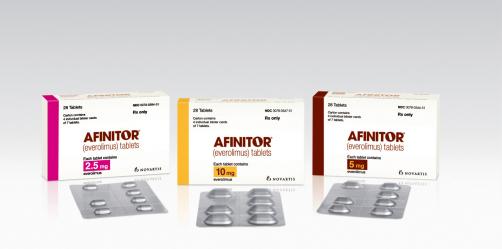Decision to axe Afinitor 'confirms worst fears’ for Cancer Drug Fund

Funding for two cancer drugs, Novartis’ breast cancer treatment Afinitor and Janssen’s Imbruvica for mantle cell lymphoma is set to be cut – a decision which has sparked renewed protest from one cancer charity.
Before England set up its Cancer Drugs Fund (CDF) in late 2010, cost effectiveness watchdog NICE frequently blocked funding for new oncology drugs. Now after years of rising costs, the CDF system has been revised, with NICE now in control of all cancer drug cost-effectiveness decisions once again.
Cancer charities and pharma companies had warned that the new CDF could see access to treatments go into reverse – and now draft guidance on Afinitor and Imbruvica suggests this could well be the case.
The draft decisions from NICE are part of a complete review of all 31 so-called ‘legacy’ drugs on the CDF, and the signs are that the review will see many more removed in the coming weeks.
Afinitor is the first of the breast cancer drugs to be reappraised from the old CDF. The drug, which has been available in England via the CDF since 2013, will now not be available to any new patients in England from February 2017, despite it being routinely available in both Scotland and Wales.
Baroness Delyth Morgan, Chief Executive at Breast Cancer Now, said:
“This is a huge blow to many breast cancer patients and we fear this decision could be just a taste of what’s to come for innovative breast cancer drugs in England.
“The decision means that, for the first time, an effective breast cancer drug will be available in Wales and Scotland but not in England.
She added: “Our worst fears about the re-launched CDF are being realised. Without further reform to NICE’s appraisal process, we are deeply concerned that Afinitor will be the first of many breast cancer drugs to which patients in England will be cruelly denied access.”
NICE has been asked by NHS England to review all the drugs on the old CDF in order to weed any which are not cost effective. The aim is to remove these drugs will otherwise eat up the majority of the new CDF’s annual budget – £340 million – leaving none for drugs nominated for the new CDF.
“This is not a particularly expensive cancer drug and we believe it should be within reach of NICE’s cost-effectiveness threshold,” added Baroness Morgan. “We now call on both NICE and Novartis to put patients first and find an agreement that ensures England doesn’t fall behind the rest of Great Britain in access to Afinitor.”
NICE says neither drug was cost effective enough to gain recommendation, even after Novartis and Janssen offered price discounts. The companies will have the chance to offer further discounts before NICE makes its final decision, although the price cuts offered will remain confidential.
Earlier this week Breast Cancer Now teamed up with Prostate Cancer UK to publish research which showed the UK still far behind comparable nations in terms of access to cancer drugs.
The charities united to call for a complete overhaul of the UK system, and said direct negotiations with pharma companies on drug prices would help increase access.
There are no signs such a reform is on the cards, however. Pharma industry association the ABPI also responded to the calls, saying it is ‘too simplistic’ to say new pricing negotiations would fix the problem, pointing instead to flaws in NICE’s appraisal system.
UPDATE: NICE has since clarified that it is not recommending these drugs are removed from the CDF. It is advising that Afinitor and Imbruvica are not cost effective, which means they may be removed from the CDF list in due course. NICE’s appraisal decisions are preliminary and open for consultation.











